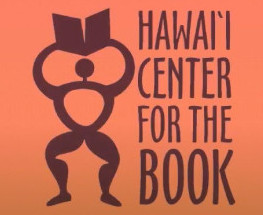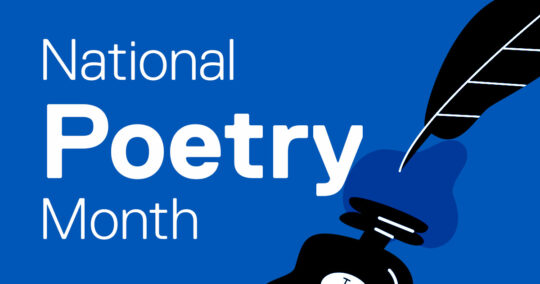Hawaiian in Ohio: A Celebration of “Native Hawaiian/Pacific Islander and Asian American Heritage Month”
The Ohio Center for the Book is pleased to host acclaimed Native Hawaiian and Ohio-resident poet/musician/artist Joe Balaz for a performance of “Hawaiian in Ohio: A Celebration of ‘Native Hawaiian/Pacific Islander and Asian American Heritage Month’“ on Saturday, May 6 at 3:30 p.m. in the Cleveland Public Library Auditorium in the Lower Level of the […]

The Ohio Center for the Book is pleased to host acclaimed Native Hawaiian and Ohio-resident poet/musician/artist Joe Balaz for a performance of “Hawaiian in Ohio: A Celebration of ‘Native Hawaiian/Pacific Islander and Asian American Heritage Month’“ on Saturday, May 6 at 3:30 p.m. in the Cleveland Public Library Auditorium in the Lower Level of the Louis Stokes Wing, 325 Superior Avenue East, in downtown Cleveland, Ohio.
The event will include a variety of Balaz’s retrospective and recent artwork, music, and poetry – including selections of his well-known work in Hawaiian Islands Pidgin (HIP), also formerly known as Hawaiʻi Creole English – followed by a conversation with Ohio Center for the Book Coordinator Don Boozer and an audience Q&A. Balaz is known for incorporating art, music, and even dance into his work for a unique performance.

About Joe Balaz and His Work
Joe Balaz was born and raised in Wahiawa on the island of O’ahu with ancestry that encompasses Hawaii, Slovakia, and Ireland. In addition to writing work in American English and Hawaiian Islands Pidgin (HIP), he also creates concrete poetry which includes often playful visual elements. Electric Laulau, his album of pidgin poetry recorded in 1998, is considered a foundational text in Kanaka Maoli (native Hawaiian) literature. “Spoken word and amplified poetry or music poetry are dynamic avenues that enhance the communal aspect of literature in general,” Balaz has said. “It’s like a chant that reaches out to you. With the oral traditions of Pacific Island cultures, one can feel a kind of continuum with these modern art forms that harken back to an older vibe.” In July 2020, Balaz was honored with the Elliot Cades Award for Literature as an Established Writer, the most prestigious literary award in Hawai’i.

His book, Pidgin Eye, published in 2019, is an anthology of 35 years of Balaz’s poetry written in Hawaiian Islands Pidgin although he also writes poetry in American English as well. Pidgin Eye received very positive reviews in publications as diverse as the Honolulu Star-Advertiser newspaper, NBC News, and the academic Journal of Commonwealth Literature:
“History of Pigeon”, the opening poem, unveils contemporary English as itself a long-time mixture of languages in its vocabulary and syntax. Challenging the very premise of monolingualism and colonial sovereignty, the poem suggests there is no such thing as a pure language unmixed with other languages, or free from violence and trauma.
from Juniper Ellis’s “Da decolonizing real: Liberating humour in Joe Balaz’s Pidgin Eye” in The Journal of Commonwealth, October 26, 2020
Balaz’s work appeared in Whetū Moana: Contemporary Polynesian Poems in English (2003) and in journals such as Chaminade Literary Review and Hawaiʻi Review. His paper entitled “Hawaiian Islands Pidgin Visual and Textual Poetry” was published in the academic journal Pacific Arts (2022). Balaz also edited Ho‘oma¯noa: An Anthology of Contemporary Hawaiian Literature (1989) and was also the former editor of Ramrod — A Literary & Art Journal of Hawaiʻi (1980 to 1989). He is presently the editor 13 Miles from Cleveland, available online at 13milesfromcleveland.org, a literary, art, and music magazine.

Beginning in May 2023, attendees are also encouraged to visit exhibits of Balaz’s artwork and concrete poetry on display at Cleveland Public Library’s Main Library in the Digital Library on the 3rd floor and in the International Languages Department exhibit area on the 4th floor in downtown Cleveland.
The May 6 performance is co-sponsored by the Hawaiʻi Center for the Book along with the Mānoa Center for the Humanities and Civic Engagement at the University of Hawaiʻi at Mānoa.
For additional examples of Balaz’s work available online, check out the following links:
- Joe Balaz’s “DJ Sway” piece appeared as the cover of the Spring 2023 issue of Syncopation Literary Journal.
- Balaz’s work has also been featured in Otoliths, an online literary journal from Australia: Click here for his concrete poem, “Proceed with Caution,” and here for his other work in the issue.
- Hawaiian Soul (with Joe Balaz – click for link to clip and full documentary): A film produced in 1987, the official “Year of the Hawaiian” in Hawai’i, that posed the question, “What does it mean to be Hawaiian in Hawai’i today?” Features artists, farmers, activists, poets, musicians, and homesteaders shot on location in Maui, Moloka’i, Kaua’i, Hawai’i Island, and O’ahu, Hawai’i. Victoria Keith, producer/director; Naomi Sodetani, assistant director and co-producer.
- “Message to My Sistah” (poem) at Academy of American Poets website along with classroom activities for teaching the poem.
- Domino Buzz (YouTube channel) – A variety of poetry, music, and art by Balaz
- Modern Poetry Review (two poems by Balaz)
- OLA: An online chapbook collection of Balaz’s work – textual and concrete poetry – from TinFish (available courtesy of the Electronic Poetry Center at the University of Pennsylvania)
- IUMA from the album Electric Laulau (available on Internet Archive)
- Balaz’s poem “Charlene” was included in When the Light of the World Was Subdued, Our Songs Came Through: A Norton Anthology of Native Nations Poetry, edited by US Poet Laureate Joe Harjo along with LeAnne Howe and Jennifer Elise Foerster. Click here for a review!
Acknowledgments: In some cases, Balaz will perform to music created by other musicians. Thanks to musicians Peter Chamberlain, Peter Bombar, Tim Bombar, John Grant, Janet Mix, Richard Hamasaki, and H. Doug Matsuoka for providing this music in various performance pieces. Also, thanks to Mary Ellen Derwis, for her filmmaking and video. Special thanks to Cleveland musicians Mark Tapanja, Tim Tapanja, Mike Tapanja, Al Rothacker, and Robert Mozik for allowing their instrumental music to be shared with the public in “Eastside / Westside” which is a music/poem collaboration written by Balaz in 2006 and performed in a music video that was filmed by Balaz and Cleveland-born Mary Ellen Derwis in a living room in Brecksville. The Cleveland musicians were known as Fourteenth Floor, remembered by many in Cleveland for their classic album Circus, Saints, and Sinners, recorded in Lakewood, Ohio, and released in Cleveland in 1992.

